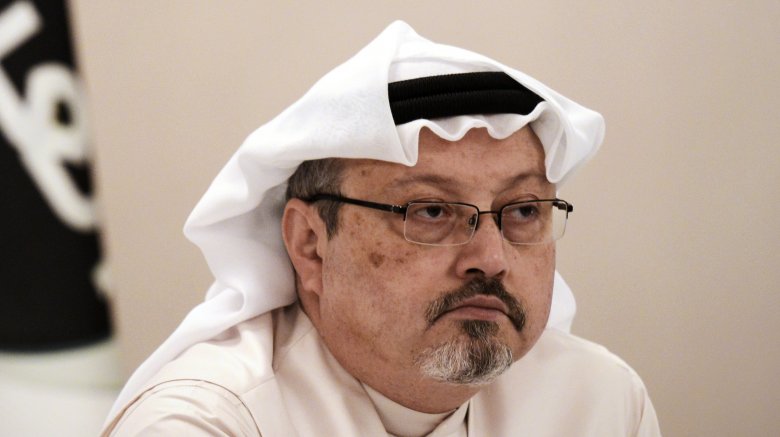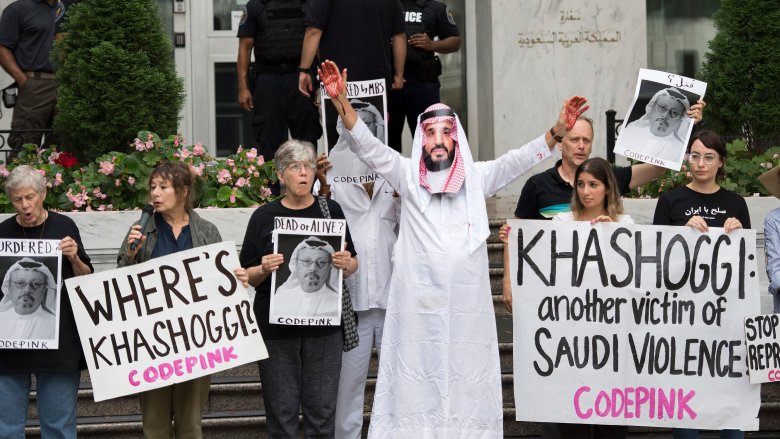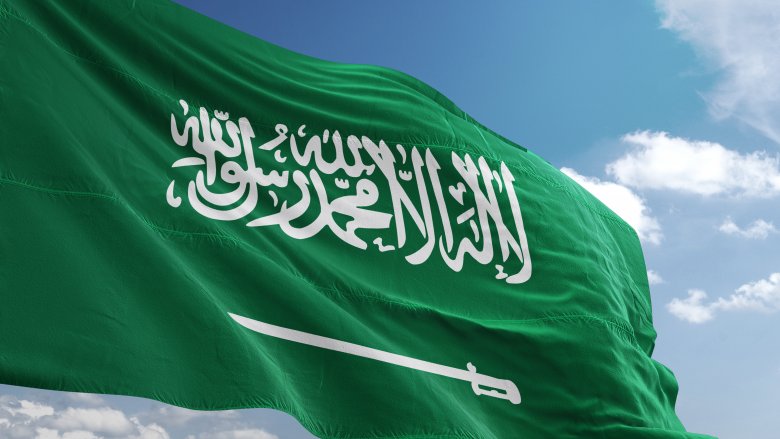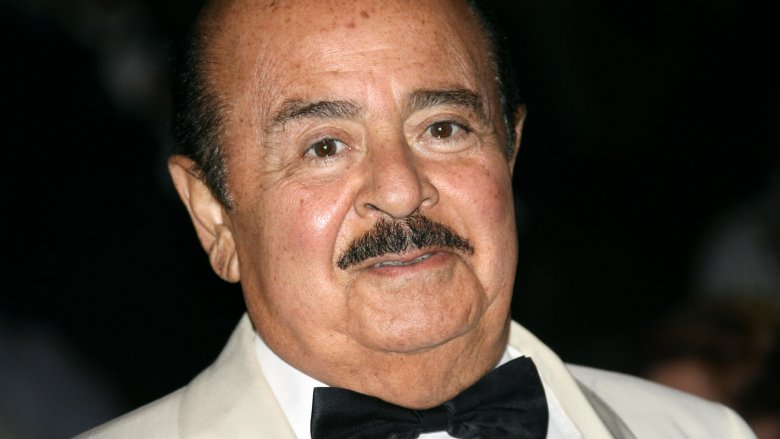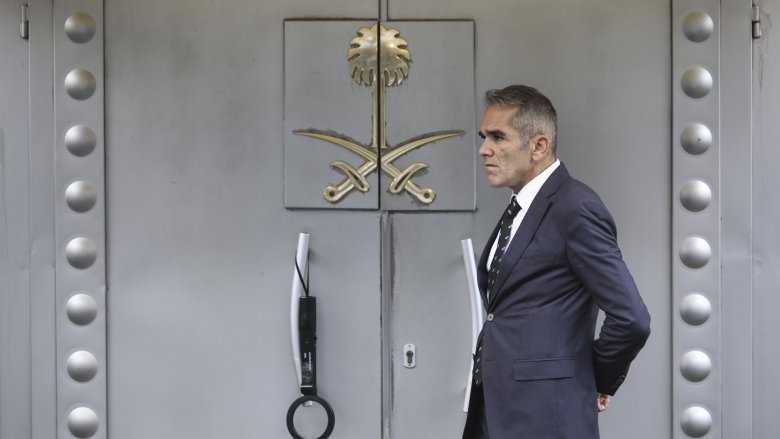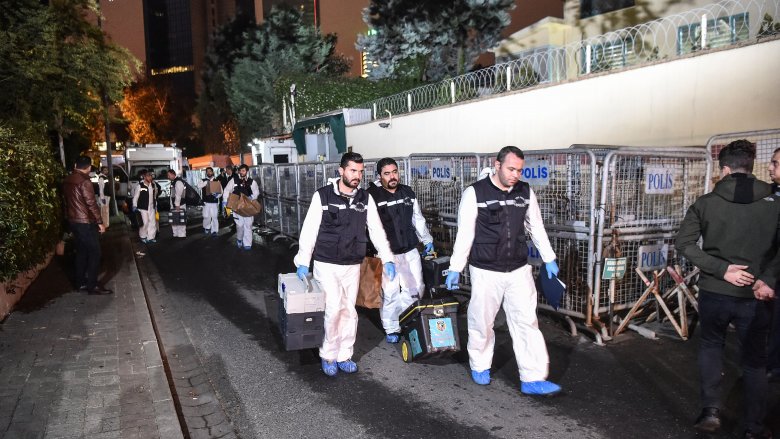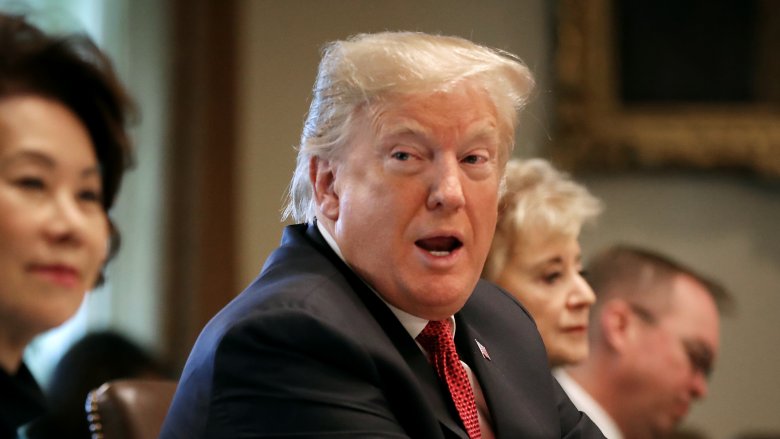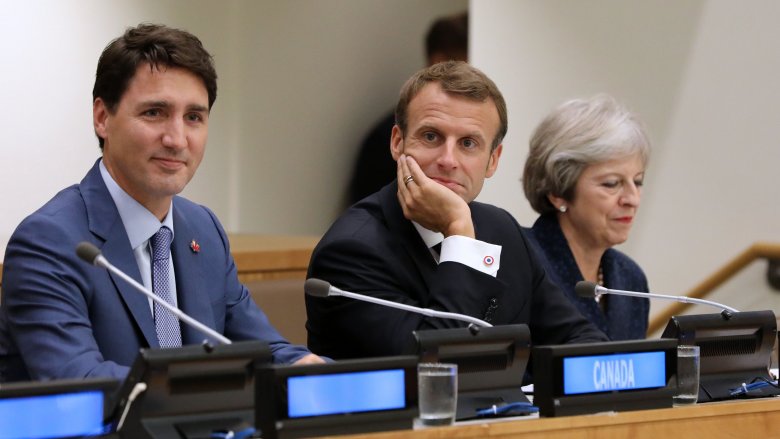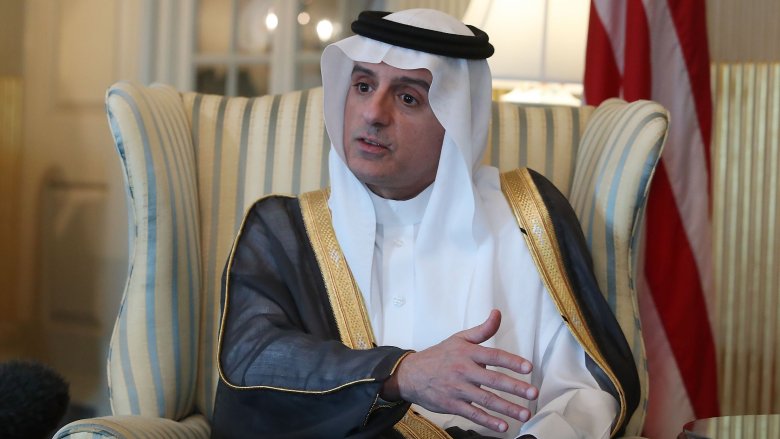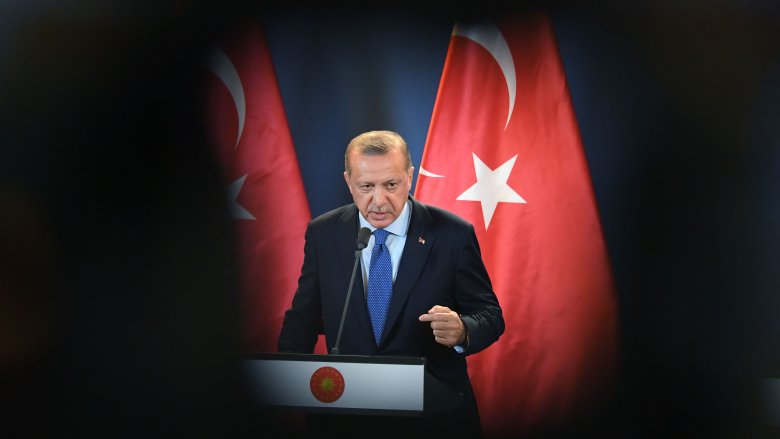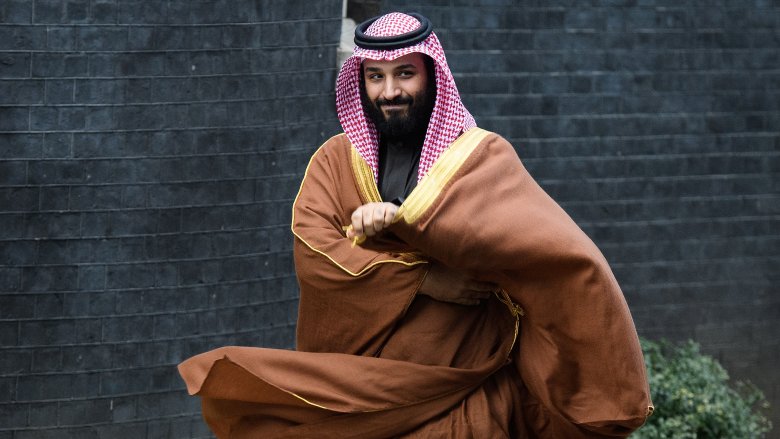Everything You Should Know About Jamal Khashoggi
Jamal Khashoggi was a well-known journalist who went missing after entering the Saudi Arabian consulate in Istanbul on October 2, 2018. This immediately became an international incident. Had the Saudis killed him because he openly criticized the country? If they had, it would be the most brazen act yet of the government's crackdown on dissidents.
In America the president might call the press the "enemy of the people," but in Saudi Arabia they straight up throw journalists they don't like in jail. Still, high-profile murder was a whole new level, even for the Saudis. They denied everything at first, saying Khashoggi left the consulate in one piece. But evidence started piling up that no one could ignore.
This is a still developing story with serious international repercussions. Here's everything you need to about who Jamal Khashoggi was, what happened to him, and the chain reaction that set it all off.
He wasn't afraid to voice his many criticisms of Saudi Arabia
As an editorial writer for the Washington Post in 2017 and 2018, Khashoggi did not hold back on his criticisms of Saudi Arabia, and in particular of the de facto ruler, Crown Prince Mohammed bin Salman (MBS). After his disappearance, the Post put together clips of some of the things he'd said that may have angered the wrong people.
Khashoggi wrote that despite MBS promising reform and tolerance, the prince was rounding up dozens of intellectuals and religious leaders who dared disagree with him and throwing them in prison. While the prince described them as "extremists," Khashoggi insisted they were "mildly critical" of the government at best. In another article, he compared MBS to Putin. He reported that the Saudi media is completely controlled by the royal family and that important scandals do not get publicized because of fear. Khashoggi also attacked Saudi Arabia's actions in Lebanon, saying they were "undermining the security" of the whole Middle East, and called on MBS to end the war in Yemen.
Even when good stuff happened, like women finally being allowed to drive, Khashoggi said the prince had not gone far enough and pointed out he was still arresting women activists.
But don't get the idea that Khashoggi hated Saudi Arabia. As his editor said after he disappeared, everything he wrote was "out of a sense of love for his country." He loved his home, so he gently pointed out things that could be improved.
Saudi Arabia had been trying to shut him up for ages
Khashoggi probably felt safe making those criticisms, because he did it from Washington D.C., where he lived in exile. He wrote in the Washington Post, "I have left my home, my family and my job, and I am raising my voice. ... I can speak when so many cannot."
He fled Saudi Arabia in June 2017, after he'd been "silenced by the government for six months." Khashoggi told Vanity Fair that he'd given a speech in the U.S. in November 2016 that was "lightly critical" of then-president-elect Trump. When he arrived back in Saudi Arabia he got a call from MBS' media adviser saying he wasn't allowed to tweet or write his newspaper column or give any comments to foreign journalists. According to Khashoggi he was "ordered silent."
This was far from the first time the government had told him to shut up. Twice he was editor-in-chief of the newspaper al-Watan, and twice he was forced to resign for publishing things the royals didn't like. The BBC reported in 2010 that he'd "clashed with the authorities before with articles on the religious police and women's rights." But he was forced out after publishing an opinion piece by a famous poet that was critical of an extremely conservative form of Islam.
The Daily Sabah says even outside Saudi Arabia, Khashoggi still faced censorship. In 2015, he started a satellite TV station based in Bahrain. It was shut down 11 hours after it started broadcasting.
His connections weren't enough to save him
In a country where connections are everything, Khashoggi had plenty. One of the things that makes his death so shocking is his intimate relationship with the House of Saud.
According to VOA News, Khashoggi came from a "powerful and well-known" family in Saudi Arabia. His grandfather had been personal physician to the founder of the kingdom. His uncle Adnan Khashoggi (pictured) was a billionaire Saudi arms dealer, who was famously a major player in the Iran-Contra scandal. (And in a weird connection to the president, Trump told David Letterman in 1988 that he'd bought a huge yacht from said uncle.) Khashoggi's first cousin was Dodi Fayed, who was dating Princess Diana and died alongside her in a car crash in 1997.
Khashoggi was also an adviser and media aide to Prince Turki al-Faisal, a long-time Saudi intelligence chief and ambassador to the U.S. and U.K., whom the Washington Post described as Khashoggi's "patron." Even his extremely short-lived TV channel had the backing of Saudi billionaire Prince Alwaleed bin Talal.
Then there was Khashoggi's acquaintance with Osama bin Laden. The Washington Post reports that in the 1980s, the journalist was embedded with bin Laden and wrote one of the first profiles of the terrorist. Bin Laden then personally invited Khashoggi to accompany him to Afghanistan, where he was fighting the Soviets. They knew each other well enough that in 1995, the bin Laden family asked Khashoggi to meet with Osama and implore him to give up violence. The meeting happened, but Khashoggi was obviously unsuccessful.
He died because he needed documents
So why was Khashoggi, who feared the Saudi government, even in the Saudi consulate in Istanbul? Quite simply, love. He'd met a Turkish woman and they'd gotten engaged. But to get married, the much-divorced Khashoggi needed a document proving all his past relationships had legally ended.
According to his fiancee, Hatice Cengiz, Khashoggi was nervous the first time they went to the consulate. He was "worried something might happen" and even said maybe it was better if he didn't go. But Khashoggi was "determined to get married" so he "sought assurances" about his safety. He went inside and apparently everyone was lovely to him, but they told him he'd have to come back and get the document in a week.
They returned on October 2, and Cengiz said she would wait for Khashoggi by the front entrance. He replied, "Fine, my darling," and went inside. It was the last time she saw him. She waited for hours. At 4 p.m., Cengiz realized something was seriously wrong, especially since the consulate closed at 3:30. She asked a guard where Khashoggi was and was told there was no one inside. The journalist had told her to call an aide to the Turkish president if anything happened to him, so she did, as well as calling the police.
When confronted, the Saudis originally said Khashoggi had simply walked out the back door, even though he knew his fiancee was at the front waiting for him.
His death was (probably) horrific
The BBC gathered numerous reports that have pieced together a picture of what happened to Khashoggi once he went into the consulate. According to the reporting:
Turkish employees were "hastily" told to leave when Khashoggi entered, and the journalist was confronted by a 15-man "hit squad." They had all been flown in on two private jets early that morning for the specific purpose of killing Khashoggi. Many had connections to MBS and the intelligence services. One of the men was a doctor specializing in postmortems, and they even brought a bone saw so they could more easily dispose of Khashoggi's body.
When the Saudi consul general realized it was going to get messy, he said, "Do this outside. You're going to get me in trouble." One of the agents then told him if he didn't shut up he'd be killed when he returned to Saudi Arabia.
First, Khashoggi was interrogated and tortured. The Saudis originally said he was killed accidentally after "discussions" led to an argument and a fist fight. Their final investigation (via ABC News) revealed the journalist had been placed in a chokehold to stop him calling for help. Within two hours of his arrival, Khashoggi was dead. Then he was dismembered with the bone saw and his body parts were given to a "local cooperator" for "disposal."
The 15 men needed to subdue and kill one 59-year-old man all left the country that day. Their movements outside the consulate and in the airport were caught on camera.
Donald Trump took a long time to make the logical connection
Initially, it seemed like the president did not want to believe the Saudis were involved in Khashoggi's disappearance. He made a big deal about how Khashoggi wasn't an "American citizen" (he was a permanent resident), said blaming the Saudis was just like people rushing to judge Brett Kavanaugh, that the Saudi prince promised the president he knew nothing about it so "rogue killers" probably did it, and even if the Saudis did do it it's not worth risking billions in arms deals (even though the U.S. makes more money trading with the Swiss).
But eventually, even Trump had to admit it looked like something was up. Newsweek reports that 16 days after Khashoggi disappeared, the president finally said that it "certainly" looked like the reporter was dead. He told the New York Times that "unless the miracle of all miracles happens" Khashoggi wasn't going to turn up. Trump also said he believed the information he was getting from intelligence services, saying it was coming from "every side" and it was "not a positive."
This change of heart might have come because Turkish media reported the murder had actually been recorded. ABC News says it was rumored Secretary of State Mike Pompeo had heard the recording. While the White House denied this, Trump admitted he had requested to hear it, "if it exists," according to Time.
The international response has been equally weak
Middle Eastern countries have tripped over themselves to defend their neighbor. Middle East Eye collected their responses to the murder accusations. The UAE said they will always stand with Saudi Arabia. Lebanon said this was nothing more than a campaign meant to hurt the region. The Palestinian president said the Saudis had his "full confidence." Egypt "reaffirmed its support" for the kingdom. And on and on and on. Even Saudi Arabia's archenemy Iran simply said they had no comment.
Western countries have mostly been toothless in their responses. According to Newsweek, France, the U.K., and Germany released a joint statement saying they wanted "a credible investigation to establish the truth about what happened, and — if relevant — to identify those bearing responsibility for the disappearance of Jamal Khashoggi, and ensure that they are held to account." Canada did little more than sign on to that statement, even though Saudi Arabia recently broke ties with the country. The EU's head diplomat also simply called for an investigation.
The business world seems to be taking this a little more seriously. The Saudis are set to hold a huge investment conference known as "Davos in the Desert," but after Khashoggi's disappearance, big names started pulling out. The heads of companies like Virgin, Uber, MasterCard, and Ford were among the many who declined their invitations. Various financial giants and media organizations also cut ties. And finally some politicians declared they were not going, including U.S. Treasury Secretary Steven Mnuchin.
Saudi Arabia released their findings
Even before the Saudis concluded their investigation into Khashoggi's death, CNN noted they could probably find a "scapegoat." And surprising no one, they did.
Foreign Minister Adel al-Jubeir (pictured) told Fox News (via the BBC) that it had been a "rogue operation" and totally pinky swore that MBS knew absolutely nothing about it, let alone ordered it. While al-Jubeir admitted Khashoggi's death was "murder" and a "tremendous mistake," he said the guys who did it were "outside the scope of their authority." He promised, "Even the senior leadership of our intelligence service was not aware of [the murder]." The government also claims they have no idea where Khashoggi's body is and that their attempt at a cover up was "unacceptable."
Al-Jubeir also said that they were "determined to punish those who are responsible for this murder." And Saudi Arabia did appear to take action. They arrested 18 people and two of MBS' close aides were fired. The crown prince also set up a body (that he is in charge of, of course) that will supposedly reform the country's intelligence agency, maybe so random guys don't randomly fly to another country to randomly kill journalists for absolutely no reason again.
Both King Salman and MBS called Khashoggi's son to say how sorry they were, which must have been one hell of an interesting phone call. However, ABC News Australia says all this "has widely been viewed as an attempt to cover up the Crown Prince's role in the murder."
Turkey is conducting its own investigation
Turkish President Recep Tayyip Erdogan gave a special parliamentary address on October 23 to discuss the investigation, but most of what he covered was already widely known because of planned government leaks, according to the New York Times. "It is clear that this savage murder did not happen instantly but was planned," he said. He pressed Saudi Arabia for more information and said he will ask King Salman to move the investigation to Turkey from Saudi Arabia. It doesn't seem like Erdogan is ready to let this one go, basically. As for the events of the day in question:
ABC News Australia reports that MBS actually called Khashoggi at the consulate and tried to convince him to return to Saudi Arabia. The journalist refused because he knew he'd be arrested if he went back. After the prince hung up, Khashoggi was murdered. And it may have been so much worse than what was originally reported, perhaps involving being held down while his fingers were hacked off before being injected with a lethal drug.
Turkish authorities went over the consulate with a fine-tooth comb, as well as tracked the movements of two Saudi consulate vehicles. They are currently searching a forest and another city for Khashoggi's remains. Istanbul's chief prosecutor is demanding testimony from 28 more staff members of the consulate. Previous interrogations revealed some Turkish employees said they were told not to go to work the day Khashoggi disappeared.
On October 25, the Saudi public prosecutor announced that because of information received from Turkey, it appeared that the accused men had planned the attack in advance, and that it was not, in fact, a surprise fist fight or a disappearance. Yes, truly shocking stuff.
Saudi Arabia might never see any consequences
It remains to be seen if Saudi Arabia will essentially get away with murder. While CNBC reports Vice President Mike Pence warned "there will be consequences," the president has not taken so tough a stance.
Not only does the U.S. have a cozy relationship with the country, but according to the Daily Beast, presidential son-in-law Jared Kushner is said to be good friends with MBS. And after the Saudis announced their findings (totally absolving the prince of any guilt) Trump said he'd talk to MBS personally and that the fact the kingdom had made arrests was "very important."
One anonymous U.S. official said, "We don't really know if Trump has the backbone to follow through with sanctions or with other consequences," and that MBS firing a couple people might be "all it takes for us to go back to normal." However, the Washington Post insists bipartisan calls to do something are growing in Congress. Some proposed punishments include "sanctions ... the expulsion of the Saudi ambassador and the cutting of arms sales," plus demanding the crown prince step down if he was ultimately responsible for the murder.
The Independent says the Germans feel the Saudi explanation of what happened was "inadequate" and that they would rethink selling arms to the kingdom. Britain said it was considering its "next steps" and that there would be "consequences," without explaining what those might be. No one seems to want to be the first to do anything.
